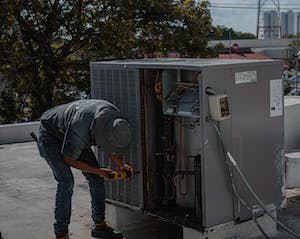How does air conditioning work?
by siteadmin

Air conditioning is an important component of central heating systems and cooling systems. Understanding its operation is key to selecting the best system for you.
Air conditioners can convert liquid refrigerant back and forth to gas to cool. This process uses three times as much power as the compressor.
Refrigerant
The refrigerator fluid is an essential component of air conditioning. This fluid absorbs the heat inside before dissipating into the atmosphere.
The boiling point of the fluid in a refrigerator is lower than that of water. It can evaporate more quickly into the atmosphere and use less energy.
The first step in the refrigeration cycle involves compression. A compressor turns liquid refrigerant to gas by compressing it. This increases the temperature of the gas by 1oF.
A condenser circulates the cooling gas around its pipes using fans.
Once the refrigerant in your home is cool enough for your refrigeration system to handle it, the cycle returns to the home's compressor. It continues until the metering unit indicates that your home has reached the temperature you want.
Compressor
Air conditioning systems are not effective without compressors. They allow your system to absorb heat, and then release it outdoors by pumping refrigerant. Without compressors home temperatures could only be set at a single temperature.
The compressor is an enclosed metal container with two openings. There are two: one for taking refrigerant in from the evaporator; and a second to send pressurized air out of its condenser. There are several types of compressed, including reciprocating models and scroll models.
Reed valves on a compressor regulate the entrance and exit of refrigerant. To function effectively, these valves must be securely seated. An improperly seated intake-reed can allow refrigerant leaking into the system of low side pressurization, increasing low-side pressure levels and reducing cooling effect.
Condenser
Condensers can be a crucial component in an AC system. They are often unnoticed. This unit can be found outside on a roof or in a yard. It works to cool the home by absorbing or dissipating heat, depending on the time of year.
Your air conditioner condenser receives the gas from its compressor, and transforms it into liquid by using heat transfer principles. When something heats up its energy always transfers to cooler materials that absorb it much more readily than itself.
It is easy to check the temperature by comparing your refrigerant to the air temperature outside. If the temperature is higher than expected, it could indicate that your AC unit's cooling performance may be inadequate.
It is important to call a professional as soon as your condenser stops working. Doing so will help to prevent any future problems. For older AC systems replacing key components, such as condensers, may also prove beneficial.
Evaporator
Evaporators coils form an integral part of your air conditioning system. They work alongside condenser coils to provide both heating as well as cooling to your home.
Change of State is the process by which liquid refrigerant transforms rapidly into vapor when it enters an Evaporator coil.
Evaporator Coils are essential to the operation and efficiency of any air conditioning system. Without enough refrigerant delivered to them, they will be unable to expand as much, resulting in a cooling process that is inefficient and wasted electricity.
To perform optimally, coils should be kept free of dirt. Any buildup will reduce their ability for heat to be absorbed and dispersed efficiently, increasing your bills and decreasing the comfort level of your home.
https://www.hvacsaltlakecityut.com/
furnace installation salt lake city
furnace replacement company salt lake city
Air conditioning is an important component of central heating systems and cooling systems. Understanding its operation is key to selecting the best system for you. Air conditioners can convert liquid refrigerant back and forth to gas to cool. This process uses three times as much power as the compressor. Refrigerant The refrigerator fluid is an…
